

There is where parenting styles are introduced to respond to the needs in demanding on their children. Parenting styles represent border patterns of parenting practices.
There are various theories and opinions in parenting styles. Therefore parents create own parenting styles from a combination of involvement from the time new infant to develop their own personalities, adolescents, Even the parenting styles of difference from East and West
Are we really ready to become parents? Which parenting style suits us?
All the answer are just clicking away.
What Is My Parenting Style? Four Types of Parenting. One of the interesting things about being a parent is that there is great variation in how we raise our children.
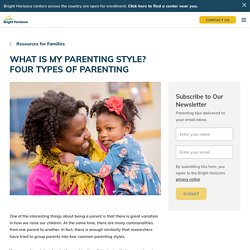
At the same time, there are many commonalities from one parent to another. In fact, there is enough similarity that researchers have tried to group parents into four common parenting styles. Your parenting style refers to the combination of strategies that you use to raise your children. The work of Diane Baumrind in the 1960s created one commonly-referenced categorization of parenting styles. The four Baumrind parenting styles have distinct names and characteristics: Authoritarian or Disciplinarian Permissive or Indulgent Uninvolved Authoritative. The 4 Parenting Styles: What Works and What Doesn’t. By Dr.
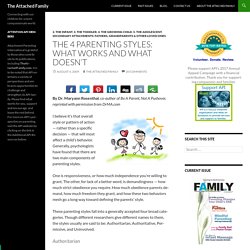
Maryann Rosenthal, co-author of Be A Parent, Not A Pushover, reprinted with permission from DrMA.com I believe it’s that overall style or pattern of action — rather than a specific decision — that will most affect a child’s behavior. 4 Types of Parenting Philosophies Explained. Michael H/Getty Images If there’s one thing we know about parenting, it’s that there’s a lot of coloring outside the lines—not just for kids, but for adults, too.
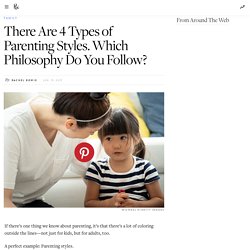
A perfect example: Parenting styles. The term parenting style was actually coined by child development psychologist Diana Baumrind in the 1960s, when she determined that there were four distinct (and quite different) approaches to raising kids after observing preschoolers and conducting research at the University of California, Berkeley. They are: AuthoritarianAuthoritativePermissiveUninvolved The definitions for each were determined by two important components: 1) the demands placed by parents on their children and 2) parents’ responsiveness to their kids’ needs. Still, it helps to know where you stand, value-wise, so that you always have a “compass” of sorts to fall back on—or simply a knowledge of the type of parent you don’t want to be. RELATED: 8 Parenting Trends That Will Be Huge in 2019 1. 2. 3. 4 Types of Parenting Styles & Their Effects on Children. Whether we like it or not, our style of parenting has a big impact on our child.
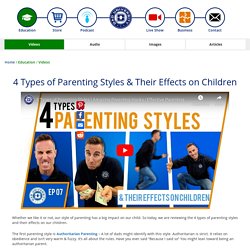
So today, we are reviewing the 4 types of parenting styles and their effects on our children. The first parenting style is Authoritarian Parenting – A lot of dads might identify with this style. Authoritarian is strict. It relies on obedience and isn’t very warm & fuzzy. It’s all about the rules. The Most Effective Parenting Style for Parenting the WorksThe Center for Parenting Education.
Often parents wonder how they can create an environment in their homes and in their relationships with their children that will nurture their children’s ability to meet the challenges they will confront as they grow and move out into the world.
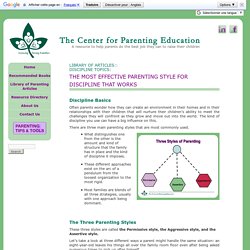
The kind of discipline you use can have a big influence on this. There are three main parenting styles that are most commonly used. What distinguishes one from the other is the amount and kind of structure that the family has in place and the kind of discipline it imposes.These different approaches exist on the arc of a pendulum from the loosest organization to the most rigid.Most families are blends ofall three strategies, usuallywith one approach being dominant. These three styles are called the Permissive style, the Aggressive style, and the Assertive style. What’s the ‘best’ parenting style to raise a successful child?
Since kids don’t come with an instruction manual, we are all just forced to figure it out as we go along.
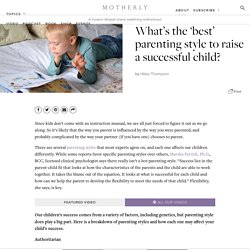
So it’s likely that the way you parent is influenced by the way you were parented, and probably complicated by the way your partner (if you have one) chooses to parent. Parenting Styles - Parenting Videos. Characterized by reasonable demands and high responsiveness.
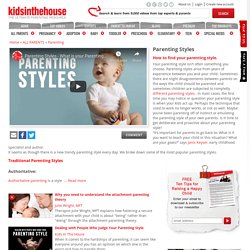
While authoritative parents might have high expectations for their children, these parents also give their kids the resources and support they need to succeed. The authoritative parenting style is about setting limits, reasoning with kids, and being responsive to their emotional needs. This approach is common in middle class settings throughout the world, and it's linked with the most successful child outcomes.
Authoritative parents are not usually as controlling as authoritarian parents, allowing the child to explore more freely, thus having them make their own decisions based upon their own reasoning. How to Discipline Young Kids Effectively: 4 Steps Every Parent Can Take. By Joan Munson, PhD Every time Karen tells her 5-year-old son Jayden it’s time to leave a friend’s house, he explodes, throwing his toys, screaming and kicking her.
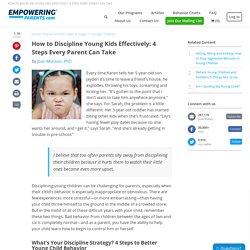
“It’s gotten to the point that I don’t want to take him anywhere anymore,” she says. For Sarah, the problem is a little different. Her 3-year-old toddler has started biting other kids when she’s frustrated. “Lily’s having fewer play dates because no one wants her around, and I get it,” says Sarah. How to Limit Bad Behavior - Aggressive Behavior in Young Children. By Joan Munson, PhD “I’m not allowed to bring Ben to play group anymore,” said Sarah, whose son is now five years old.
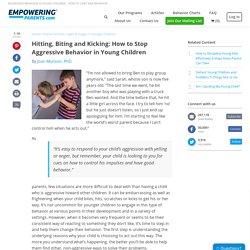
“The last time we went, he bit another boy who was playing with a truck Ben wanted. And the time before that, he hit a little girl across the face. I try to tell him ‘no’ but he just doesn’t listen, so I just end up apologizing for him. Dealing Effectively with Defiant Young Children and Toddlers. Parenting Tips for Toddlers: 5 Essential Rules for Communicating With Young Children. 12 Essential Tips for Positive Parenting Your Teen!herishing your Baby. 5 Mistakes Parents Make With Teens. Richard M.
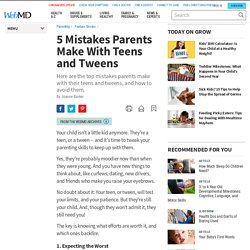
Lerner, PhD, director of the Institute for Applied Research in Youth Development, Tufts University, Medford, Mass. Robert Evans, EdD, executive director, The Human Relations Service, Wellesley, Mass. Amelia M. Arria, PhD, director, Center on Young Adult Health and Development, University of Maryland School of Public Health. News release, “Teens behaving badly? US Department of Health and Human Services – Substance Abuse and Mental Health Services Administration, “Helping Your Children Navigate Their Teenage Years: A Guide for Parents.”
Office of National Drug Control Policy, Executive Office of the President, “Prescription for Danger: A Report on the Troubling Trend of Prescription and Over-the-Counter Drug Abuse Among the Nation’s Teens.” The Partnership for a Drug-Free America, PATS TEENS 2008 REPORT. Common Problems Between Parents and Teenagers. Conflicts between parents and teens are nothing new. Whether it's curfew, cell phones or even friends, conflicts can and will arise. How well teen and parent problems are handled, and the strategies used can make all the difference. Asserting Independence Teens are striving to find independence anyway they can. More Young Adults Living With Parents. Parenting Young Adults Living at Home: Julie Hanks, LCSW on KSL's Studio 5. Controversial Parenting Style Invites Debate. Parenting in China. Queen of the Tiger Moms takes on Singapore. Yale law professor and author Amy Chua, better known as the iron-fisted Asian-American Tiger Mom, is exporting her parenting style to Singapore, with the launch of an after-school enrichment center in the tuition-crazy city-state.
The Keys Academy, which focuses both academics as well as soft skills such as creativity and leadership, aims to groom secondary-school students for university and “jobs of the future,” with classes in robot-building and computer-coding as well as “externships” with global corporations and college admissions programs. “It’s the best of both worlds,” 52-year old Chua, who is one of four advisers to the center, told CNBC on Thursday. “I like that Keys Academy preserves the hard core ‘you need to know the basics, and there’s no way around that hard work.’